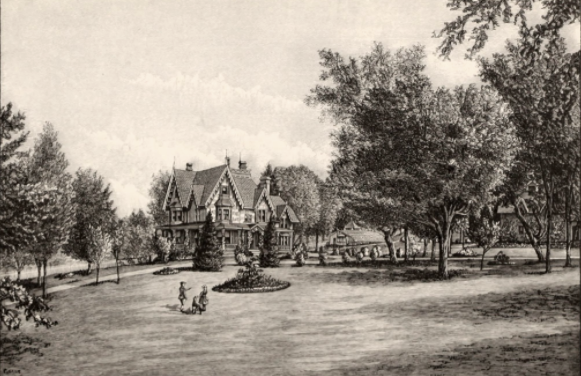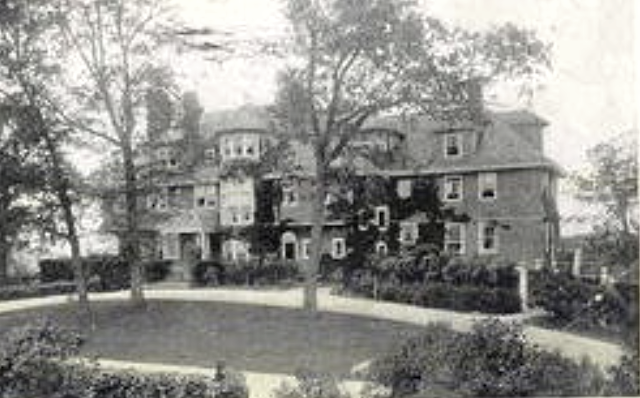Granite Lodge: Home to a Forty-Niner and a yachtsman
Jonathan Gosman Kittle's 19th century estate on the east side of North Broadway in Irvington had at least a pair of names -- first Granite Lodge and later Grey Gables -- and some interesting characters who wound up living on it.
Kittle gained control of the two-acre property from the heirs of recently deceased nonagenarian farmer Michael Mann in 1868. Mann and his family also owned a farm about two blocks north across what would become the Tarrytown line on the east side of Broadway when Tarrytown incorporated as a village in 1870, beating Irvington to the punch by two years.
 |
| Jonathan Gosman Kittle |
Before 1870, the land north of Sunnyside Lane past what would become Lyndhurst was generally considered to be part of Irvington.
Kittle (1829-1893), was born in Red Hook, N.Y., to the Rev. Andrew Nicholas Kittle and Eliza (Gosman) Kittle. He went West to seek his fortune during the gold rush of 1849 at the tender age of 20. Like most of the Forty-Niners who actually made money off the gold fields, Kittle made his by running three-masted clipper ships that brought needed products for the gold fields from New York to San Francisco (and gold for banks and brokerage houses on the return trip).
Kittle partnered with an older, established businessman, Alfred DeWitt, to form DeWitt, Kittle & Co. in San Francisco with offices also in New York at 88 Wall Street. Kittle had family ties to DeWitt through Kittle's wife Harriette DeWitt (Allen) Kittle and Harriette's family, the Allens, were also part of the DeWitt, Kittle company.
After DeWitt's retirement in 1870. Kittle took full control, operating as Kittle & Co., and moving permanently to the town of Ross in Marin County, California in 1880 where he purchased a large estate called Sunnyside from the heirs of the town's namesake. It was on that estate that he and his wife raised their family. The family would occupy the estate for a half century.
The heart of that estate remains as the Marin Art & Garden Center today.
Ingleside, built by Strange's Engish immigrant father Edwin B. Strange in 1854, still stands as part of St. Christopher's, Inc., 71 South Broadway, Dobbs Ferry, a residential treatment center serving special needs children.
Strange was a sportsman, a member of the New York Yacht Club who owned one of the premier yachts in the region, the Ariadne, a sloop that was a regular participant in New York Yacht Club events in New York Harbor. In fact, when it came time for retirement, Strange sold his Irvington estate and moved to Long Branch, New Jersey, a favorite haunt of U.S. presidents including Ulysses S. Grant, who watched at least one of Ariadne's races in in nearby New York Harbor.
 |
Theodore A. Strange |
The Strange family sold Granite Lodge, 130 N. Broadway, in 1915 to William S. Emery, who renamed it Grey Gables. Emery sold the property to the family of James Hall in early 1925. Emery died of a stroke at age 58 several months later on a trip to California.
Hall purchased Greg Gables' neighboring Broadlawn estate at 120 North Broadway shortly thereafter, which almost tripled the size of his original holding. His heirs sold the combined properties, known as Broadlawn, in mid-1940 and they were developed in 1947 as Irvington Gardens apartments, with rents ranging from $87 per month for a 3-1/2 room apartment to $105 for a five-room apartment. Veterans were given preference for leases and federal funds helped complete the project at 120 North Broadway today.
AUTHOR'S NOTE: Special thanks to Chet Kerr of the Irvington Historical Society for his research help with the Kittle family and property transfer documentation on this estate.













Comments
Post a Comment
If you would like to weigh-in, feel free ...